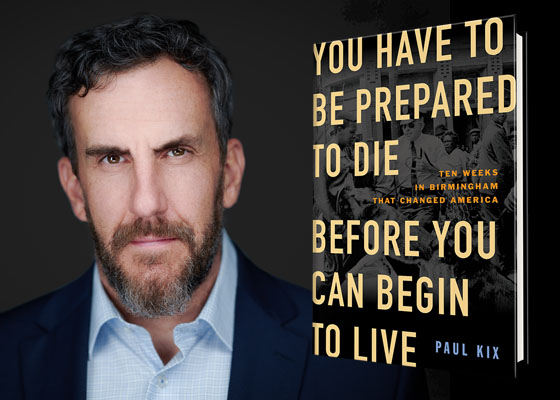You Have to Be Prepared to Die Before You Can Begin to Live intimately details the ten weeks of the Birmingham Campaign.
What inspired you to write You Have to Be Prepared to Die Before You Can Begin to Live?
My kids. I detail this in the prologue and epilogue,. but I’m white, my wife’s Black, and our three children identify as Black. The summer of 2020 was a hard one for them, watching the clips of George Floyd’s murder and, as a result, losing their innocence. Their view of America hardened into a cynicism that bordered on despair. I wanted them to carry into adulthood an optimism about themselves and their place in this country. I chose to focus on the one civil rights campaign that had long fascinated me to show the kids that this was how they, too, could be bold and persevere.
The book is an open letter to them.
Your book gives detailed insight into the thoughts and feelings of the individuals involved with the 1963 Birmingham campaign. Tell us about your research process.
I’m fortunate to stand on the shoulders of giants. The scholarship of the Civil Rights Movement is vast — perhaps unequaled in American letters, with the possible exception of the Civil War. I relied on scores of books to write my own: histories, memoirs, oral histories. Many of these books were written before the advent of the Internet, and the digital age only added to my resources. Numerous university libraries have released personal correspondences of the book’s protagonists. Then there are the recorded video interviews, and remastered audio interviews, and the slew of recently released oral histories that the Birmingham Public Library and the Birmingham Civil Rights Institute, in particular, have made public. There were dozens, maybe hundreds of interviews and perspectives that the giants who came before me didn’t have access to. I spent weeks, months going over this fresh material.
It was overwhelming to organize everything, but as I combed through my notes and created folders and then subfolders, I also got inspired. There was so much material that enabled me to describe what happened and then explain why it happened — and from certain protagonists’ perspectives. This why allowed me to get inside, as you say, “the thoughts and feelings of the individuals involved.” That’s all you want as a nonfiction author: the what, and then the how and the why. When you have all three, you have someone’s external action, internal motivation, and spiritual truth.
Of all the people who played a significant role in the Birmingham campaign, who did you find most compelling to write about, and why?
Fred Shuttlesworth. Hands down. I didn’t know much about Fred when I started the research, but came away thinking he should be honored in the way King is. Fred Shuttlesworth is the bravest person I’ve ever encountered. He was also deeply flawed, deeply human. And, again, for a nonfiction author, that’s all you want.
What is one thing that even those very familiar with the Civil Rights Movement will be surprised to learn?
What it was actually like during D-Day and Double D-Day for the children who marched. Those perspectives are new because of how much time other institutions have spent interviewing the survivors. The majority of these interviews didn’t even begin until the 1990s, and the interviews themselves have only been released in the last few years.
What also struck me was the cat-and-mouse game between the SCLC [Southern Christian Leadership Conference] and Bull Connor. King and his acolytes almost goaded Bull to use the brutal force of his reputation. The psychological battle is in some of the earlier texts, but I chose to accentuate it for my own book. It just gripped me.
Early readers of your book have commented that it reads more like a page-turning novel than a conventional work of history. How did you decide on the writing style that you used to tell this story?
I come from a journalistic tradition — New Yorker, Atlantic, GQ, blah, blah, blah — and not an historic or academic one. I’m always looking to tell a great story. I realized early on that if I gathered enough research, my folders and subfolders and the notes they contained could get Darwinian, the anecdotes fighting to make it onto the pages of my book.
I also love to read fiction. Novelists inspire me far more than nonfiction authors do. They write better sentences, tell stories in more innovative ways. I knew if I could find the fittest-of-the-fit anecdotes, I could combine them with my love of fiction and put on the page a true account that was, as I like to say, all story.
This “all-story book” benefited from something else, too: the shortness of its period under review. My research showed that those 10 weeks in the spring of 1963 changed the Civil Rights Movement and the next 60 years of America. So my book did what others hadn’t: It just focused on those 10 weeks. My research and writing, then, became a question of depth not breadth. The deeper I went, the more intimate the book became. And the more intimate — well, the more it began to read like a page-turning novel.
As the 60th anniversary of the Birmingham campaign approaches, what are the direct parallels that readers can draw between 1963 and the present day? And in your opinion, what are the biggest obstacles that America still faces in the fight for racial equality?
These are great questions. They highlight why the book’s prologue and epilogue are set in the present day — to show the parallels between that time and ours. One parallel is that it sucks. Each era presents its own challenges and setbacks. But you can do more than gripe or, good gawd, tweet. You can act. You can change your life and how you lead it, and watch how the ripple effects of that change affect the lives of others. This call to arms isn’t overt in the narrative. But hopefully a theme that emerges from the story is the purpose you can give your life if you say, “I can.” Those guys in the movement should have abandoned hope. They never did. They remained optimistic. And they changed America in ways that not even Lincoln could have.
They changed it forever.
And maybe optimism is the answer to the second part of your question. Yes, America remains a fucked-up place, with the spread of white nationalism on the far right and an identity-obsessed far left that would rather segregate us by our skin tones than unite us by our humanity. It’s a weird and sometimes awful country, sure. But I married my wife in a former Jim Crow state. No one objected. We’re raising our kids on a shaded street. No one dynamites our home. We as a nation have progressed over these last 60 years. We should acknowledge that occasionally as we continue the work to make this a more perfect union.
What do you hope readers take away from your book?
What it was like. What it was like to live through those days. The courage it took, the ingenuity, the defiance: I think those 10 weeks in Birmingham embody the greatest of all American stories.
I hope the reader reaches a similar conclusion.



